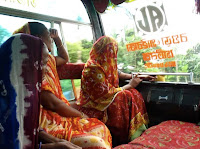The above article discusses how in India, there are now separate train cars for 'ladies only' to commute due to the sexual harassment that occurs from their male peers.

Believe me, I understand what they're feeling. In some Bangladesh buses, the front seats are saved for women. A few weeks ago, I sat in the back of a bus for the first time and was groped by a man; actually, a man who worked for the bus. I smacked him hard on the head but that, of course, changes nothing. I argue to sit in the front of the bus from now on to avoid harassment...
But I question: is creating separate space harmful or helpful when you are trying to integrate the sexes into the same space? The title is misleading, saying that there is "new peace" -- but the article goes on to discuss how men are harassing the women more, even defecating on the ladies' train to show disapproval. Men are not happy - why? Because their power is being taken away, of course. Now not only can women get jobs, but now they are encouraged because they can feel comfortable commuting on these new trains.
Until recently, I've played devil's advocate by supporting the hijab, the Muslim head scarf. I frequently recite something a female friend from Malaysia told me:
"When I was of age, my parents started making me wear the hijab. I hated it, oh it was the worst. I used to go to the mall with my friends after school and we'd rip off our hijabs and let our hair flow free. But as I got older, I started to understand what it meant. It wasn't to cover me up, but to protect me. There are a lot of bad people out there, and they know that I am a woman of Allah. It's like Christians wearing a cross around their neck to show their beliefs..."
I'd share this in my Women and Gender Studies classes, saying that after living in India, sometimes I just wanted to cover up too, hide my body so I won't be harassed. It is common to say that women should cover up in order not to tempt men into committing sinful deeds, like harassment or rape. My female friend in Malaysia said that they feel more protected from the eyes of dirty men in their hijab. Outside of religious context, I compare the 'ladies only' trains to the wearing of the hijab for the purpose of protecting women from wandering eyes and hands.
But is hiding and protecting going to change the attitude that it is alright for men to inappropriately touch women? Is wearing a hijab going to stop a man from realizing you have breasts that he could grope? Is keeping all the women at the front of the bus or in separate cars suddenly disintegrate their immoral desires? Instead of separating women, shouldn't they be teaching men to withhold and destroy these desires? When did hiding or running away from the problem actually solve it?

What needs to happen is an attitude change: a change in the male perspective from aggression to acceptance and understanding of the positive effects of women empowerment. I've read articles of both Western and local women and men giving lectures about positive aspects of women's empowerment to men. I've read signs placed in public spaces by the government and NGOs declaring the value of women's housework. But how often is our life changed by reading a sign during traffic?
One major problem I believe is implementation via the police. The NYT article states that violence against women as increased: "Between 2003 and 2007, rape cases rose by more than 30 percent, kidnapping or abduction cases rose by more than 50 percent, while torture and molestation also jumped sharply." A story is told about a woman who was beat by her husband for having a Western haircut. What happened to the husband? Did he do what is commonly done and pay off the police and got off scot-free?
The government is in favor of women's rights and empowerment, clearly stated in their order to universities to allow women to wear jeans, though the universities consider it 'indecent.' The government funded the 'ladies only' trains in an effort to allow women to take outside jobs. But, how often does the government force implementation on the rights violations of women? How often are men imprisoned for rape and assault against women? The violent acts are increasing, is imprisonment increasing at the same rate?
If Indian women, and the government they vote for* are making the decision to step outside the home and break down traditional patriarchal structures, hiding in private cars and under loose clothes will not change inherent animosity from those who take stock in patriarchy. The women and it's government must be prepared to fight and show that this isn't temporary. They must not stand silently during harassment, and the government should prove that it will not stand for the increased violence that occurs. They must prove that this change is not temporary.
*India is the world's largest democracy.
And thanks, Courtney Parks, for sending me this article!





This is all incredibly interesting. It seems all too common that when women are being victimized, the first reaction is to change something about women (all over the world, really), which has always baffled me. It should absolutely be the other way around. I agree with you, not much will change unless the men in question change.
ReplyDelete-Natalie (from SAS)